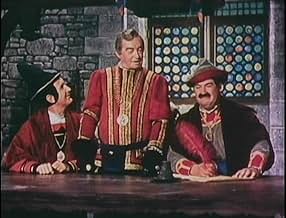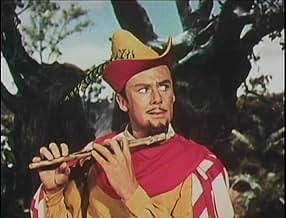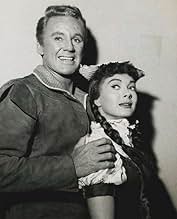Overwhelmed by rats, a medieval town hires a magical piper who can rid the town of the pest in exchange for gold but the crooked mayor has no intention of honoring the deal.Overwhelmed by rats, a medieval town hires a magical piper who can rid the town of the pest in exchange for gold but the crooked mayor has no intention of honoring the deal.Overwhelmed by rats, a medieval town hires a magical piper who can rid the town of the pest in exchange for gold but the crooked mayor has no intention of honoring the deal.
- Director
- Writers
- Stars
- Second Counselor
- (uncredited)
- Leading Citizen
- (uncredited)
- Townsman
- (uncredited)
- Citizen
- (uncredited)
- Director
- Writers
- All cast & crew
- Production, box office & more at IMDbPro
Featured reviews
While today I see the tremendous limitations of this film and would not expect today's children to suspend their belief and enter this world like I did when I first saw it, it had a real effect on me and I'm glad to be able to see it again from time to time. I don't see Kay Starr's lament to the tune of Ase's Death as a "torch song" as suggested by an earlier commenter...I remember seeing this again, as a young teenager in the mid-60's and being very moved by that song, sung after the piper lured the children into the mountain. (I also remember how MAD I was once when it was shown on New York local TV and the song - and ONLY that song - was CUT).
Now, I see the complete lack of credibility of the ending - not only did the children come home, but the corrupt mayor was deposed in favor of the forthright school master, played in a double role by Van Johnson who also was the Piper - and then joined in the resultant gaiety by playing a tune from the Piper's flute instead of being hauled off in CHAINS like one would expect...oh well.
Perhaps there is one five, six or seven-year-old who will see and hear this and it will spark his curiosity and interest as it did mine. Given the jaded nature of today's youth, mixed with the decidedly dated nature of this as a movie and a musical, I'm not holding my breath. Still, it joins "THE MUSIC MAN" (the ORIGINAL with Robert Preston) and the Alastair Sim "CHRISTMAS CAROL" as one of my three childhood favorite movies.
Geoffrey K.
This film is unusual in a number of ways. First, it's a film based on an ancient legend that became most famous with an 1842 poem of the same title, by Robert Browning. Second, its screenplay uses dialog of rhyme along the lines of that written by Browning in his poem. Third, it has a cast with some prominent actors of the day, most of whom had not made a musical before or who were little known for singing. For these reasons alone, this film has some historical significance.
The film would probably be better known and highly regarded in the 21st century if there had been prominent singing actors in the lead roles. And, the musical score, while fairly good, could have been much better. As it is, most of the songs are in a general range of the speaking voice set to music. They do have melody - more than the spoken range set to music that was Rex Harrison's singing in "My Fair Lady."
Still, it's back to the unusual that adds some value to the film. Van Johnson has the double lead of playing the Pied Piper and Truson. Johnson got his stage start with musicals, and has a good voice. This is his only film in which he has a solidly singling role. And he carries half of the film himself. Claude Rains is superb in the role of the Mayor of Hamelin, and shows that he could at least belt out a tune in harmony. This is the only musical of any sort that Rains ever made. One can only imagine that it was the idea of the type of production and the character he could play that appealed to Rains. This very gifted actor received four Academy Award nominations but never won an Oscar.
Jim Backus is the King's Emissary, and this is the only role I can think of in which his part resembled singing. Lori Nelson as Mara, and Kay Starr as John's Mother, carry the female portions of song. Stanley Adams and Doodles Weaver add some comedy to the story in their silly antics as counselors to the mayor.
With its color and colorful presentation, I think this film would still be of interest to children in modern times. And, the moral of the story should still ring true to we older children as to the young audience.
Here are some favorite lines from the film. For more dialog, see the Quotes section under this IMDb Web page of the film.
Pied Piper, "A man can strive for riches, a natural desire; but he mustn't overlook a greater goal. Or what will he profit by something he'll acquire, if in finding what he gains he lose his soul?"
Pied Piper, "A man who's unwise only sees things with his eyes."
Mayor of Hamelin, "Stop squealing and squeaking as though you were rats. Remember that you're bureaucrats."
Like so many dramatic actors, Claude Rains surprised audiences who never realized he had such a good singing voice. In addition, Doodles Weaver (of Spike Jones fame) and Stanley Adams (Cyrano Jones in 'The Trouble with Tribbles') play off each other beautifully. Van Johnson does a lovely job in his dual roles as Truson and the Piper. My favorite moments are the opening, with the Piper slithering down the tree like a snake, and the song 'Prestige' - 'Prestige is the dinner they give you for fun, which they wouldn't have done when you really needed one.' Very clever lyric, that.
Yes, the screenwriters added a happy ending. This was, after all, a family show. Besides, it nicely pointed up the moral and showed that people can repent of poor behavior and become better people.
Another reviewer comments on the colors (in a rather unsympathetic and grinch-like manner ). You must remember -- THERE WERE NO COLOR TVs IN 1957! Anyone with any knowledge of media knows that! They only existed in factories and a few individuals. They did not hit the market until 1958, and they were not in major use until after 1962 - at least among the people in my neighborhood. Anyway, the colors used had to make appealing greys when viewed in black & white. Hence, you will get some pretty odd colors. The use of such garish colors probably contributed to the development of Op-Art and Psychedelic art in the 60's. However, I digress, anyone who lets technical details get in the way of enjoying a child-like bit of fluff, especially one made on a small budget for TV, should stay up on his mountain, and never be let into who-ville.
Also, the pace of the film has been criticized. Well, the pace editing in films has sped up in the last few decades (look at Ridley Scott's work --- sheesh, you need seatbelts in the theatre!) You must let yourself go with the flow and the speed of the film. Let yourself be taken by the music and the performances. Basically, if you liked Brigadoon, then you should like this.
My recommendation -- if you are a child at heart, and want a delightful heartwarming film, filled with great music, seeing great performers enjoying themselves, then watch this film. Otherwise, go rent "The Sorrow and The Pity".
Did you know
- TriviaThis was the first motion picture ever made for television.
- GoofsHamelin ("Hameln" in German) is a town in Germany. They speak of using Guilders to pay the piper and to melt into gold bells. The Guilder was a Dutch coin and was silver.
- Quotes
Mayor of Hamelin: You have an invention?
Pied Piper: I attract attention/ Chiefly with a secret charm/ On creatures that do people harm;/ The mole, the toad, the newt and viper./
[Chuckles]
Pied Piper: Who doesn't know of the Pied Piper?
- ConnectionsEdited into Santa's Fantasy Fair (1969)
- SoundtracksIn The Hall of the Mountain King
Music by Edvard Grieg
Orchestral arrangement adapted from Grieg's music for "Peer Gynt"
Performed onscreen by Van Johnson (dubbed by an anonymous flute soloist)
with offscreen orchestra conducted by Pete King
Details
- Release date
- Country of origin
- Language
- Also known as
- Der Rattenfänger von Hameln
- Filming locations
- Production company
- See more company credits at IMDbPro
- Runtime1 hour 29 minutes
- Aspect ratio
- 1.33 : 1
Contribute to this page














